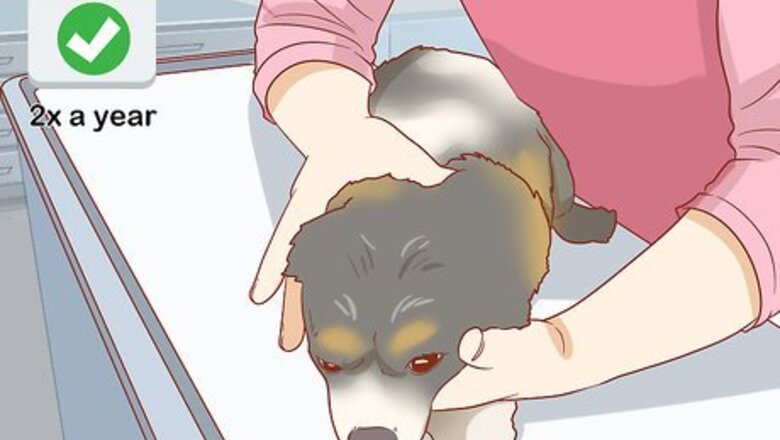
views
Maintaining Your Older Dog’s Health
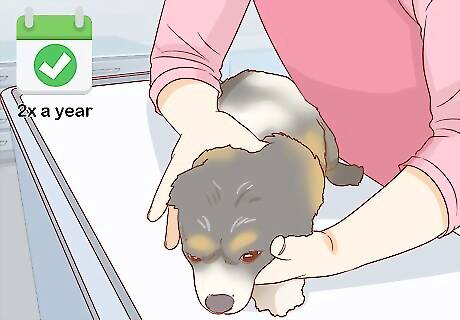
Take your dog to the vet twice a year. Routine vet visits are vital to senior pet care, so schedule check-ups for your pooch every 6 months. Regular exams can help you and the vet catch any issues as early as possible. Try to develop a strong relationship with your dog’s vet. From diet to exercise, your pet may have lots of special needs, so ask the vet for advice. Additionally, if you have a good working relationship with the vet, it’s more likely that you can call the office if you have a minor concern instead of having to pay for an appointment.
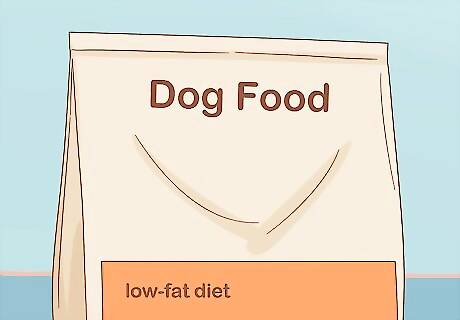
Feed your dog a well-balanced, low-fat diet. Go with a commercial dog food labeled for senior dogs. Check the label and consult the vet about the best daily amount to feed your dog. Obesity is a major health concern in senior dogs, so monitor your pet’s diet and work with the vet to help your pet maintain a healthy weight. Alternatively, feed your dog chicken or beef with a half the amount of kibble on top. Feed your dog smaller meals several times a day. Feeding it specific amounts of food instead of free feeding will help you control its weight, and smaller meals are easier on its digestive system. Even if your pal gives you its most convincing sad eyes, resist the urge to give it table scraps.Tip: If you just can’t say no when your dog begs, offer dog-safe fresh or steamed fruits and veggies. Healthy options include apples, watermelon, pumpkin, bananas, and carrots. Be sure to remove seeds and rinds, and steer clear of toxic produce, such as grapes, avocado, onions, and mushrooms.
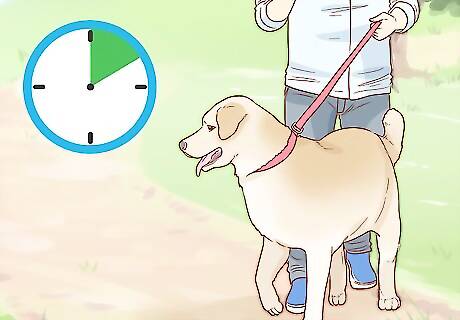
Give your dog a moderate amount of exercise. Maintain a regular exercise routine, but obey your best bud’s limits. For instance, instead of 1 to 2 long walks, go on multiple 5 to 10-minute walks per day. Before you go on a walk, do a stretch routine with your dog. Let them jump up on you, then gently pull upward on their paws. After a few moments, put them back down on all fours and pull on their back legs one at a time. As you do this, watch your dog's facial expression and body language so you don't stretch too far or cause them any pain. Exercise is important to control weight and promote healthy muscles, bones, and joints. However, arthritis, heart disease, and lung issues are common in senior dogs, so ask the vet for tips about giving your dog the right amount of exercise. Do a consistent amount of exercise throughout the week. If your older dog is used to taking short walks during the week, it may not be able to handle taking longer walks on the weekends.
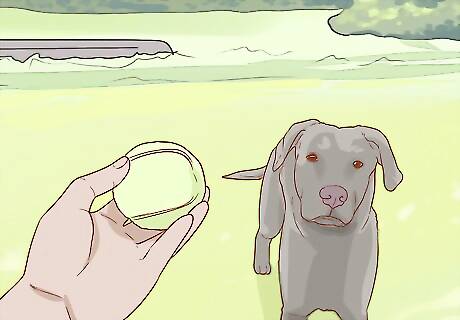
Play games together daily to keep your pet mentally active. To provide mental stimulation, play games like fetch and hide and seek, and practice tricks, if your dog knows any. In addition, interactive puzzle toys can keep your pet engaged when you’re unable to play with it. If your dog is healthy enough, try taking it to new places. For example, go for a walk down a street where you’ve never ventured. While you shouldn’t overwhelm your dog with loud, crowded, or stressful surroundings, new sights and smells can offer mental stimulation.
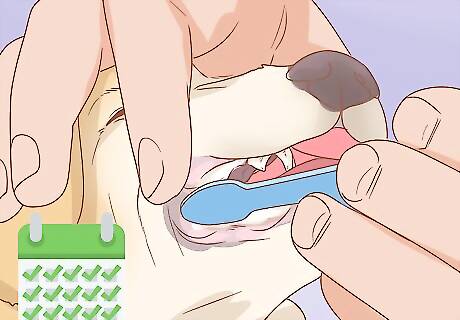
Brush your dog’s teeth daily. Dental hygiene is a crucial part of senior dog care, so brush your dog’s teeth regularly. Try to make the experience as positive as possible, offer lots of encouragement, and use a tasty, flavored canine toothpaste. Keep in mind that, in addition to regular brushing, your vet will recommend periodic professional teeth cleanings. Use a toothbrush and toothpaste specifically labeled for dogs. Never use toothpaste made for humans to brush your dog's teeth. If your dog doesn’t tolerate having its teeth brushed, try using a cloth. It’s also helpful to play games or go for a walk before tending to its teeth. That way, it’ll be tuckered out and less likely to put up a fuss.
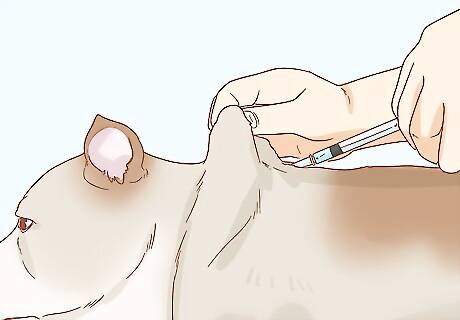
Maintain vaccination and parasite prevention routines. If your dog doesn't take any, talk to the vet about oral flea, tick, and heartworm medications. These parasites pose major health risks to senior pets, so preventative care is especially important for your older pooch. Additionally, make sure your pet gets all vaccinations recommended by the vet and required by your local jurisdiction. Like humans, older animals have weaker immune systems. Since your senior dog is less able to fight off germs and parasites, keeping up with vaccinations and parasite preventatives is a must.
Keeping Your Pet Comfortable

Make sure your dog’s food, water, toys, and bed are easily accessible. Older dogs often have mobility issues, so make accommodations to ensure your home is accessible. If your dog has trouble bending over, invest in a caddy to elevate its food and water bowls. Slippery floors can be tough to manage, so try laying down rugs in rooms your senior dog frequents. If your home has stairs, ensure your dog can access toys, a comfortable bed, and food and water on 1 floor. If your dog has mobility issues, keep its necessities within close proximity so it doesn’t have to go far if it needs something.
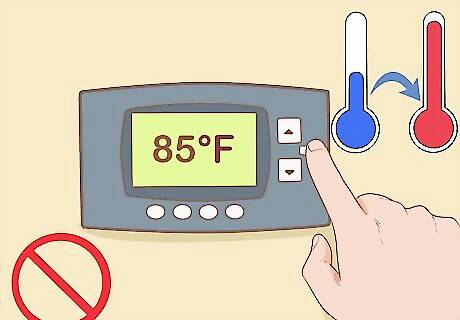
Avoid exposing your pet to extreme temperature changes. Like senior humans, older dogs have trouble regulating their body temperature and are more sensitive to extreme cold and heat. Don’t leave your senior dog outside in cold or hot weather, and notice if it starts to pant excessively or shiver. If your dog has a short coat, get it a blanket or sweater to help keep it warm. Holding a cool (or lukewarm, but not cold), damp cloth to its neck, belly, and ears can help cool it off if it's panting hard. In hot weather, dogs cool off by drinking water, so make sure your pal always has access to clean, fresh water. Additionally, staying hydrated is important for its overall health.
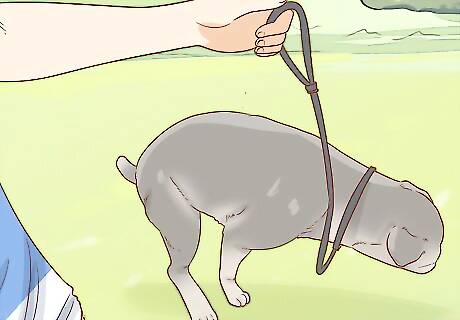
Include additional potty breaks in your routine. Holding it is harder for older dogs. That, along with eating multiple smaller meals, will mean your furry friend will need to go potty more frequently. If possible, incorporate at least 1 to 2 additional bathroom breaks into your schedule to prevent accidents. For example, if you typically take your dog out every 6 hours, try to take it out every 4 hours. If your dog has trouble holding it overnight, set an alarm and take it out for a quick late night potty break. Dealing with accidents is more than just inconvenient—it’s hard to see your pet struggle with incontinence issues. Try to be patient, and remember that your dog isn’t choosing to be “bad.” If incontinence issues have developed suddenly, schedule an appointment with the vet to rule out an underlying condition.
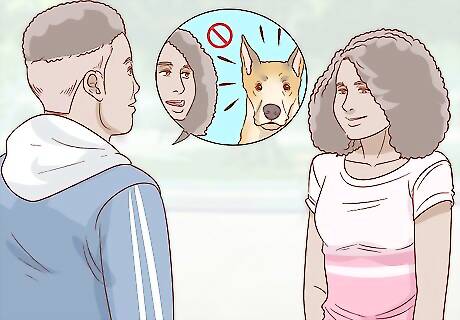
Try not to startle your dog or make sudden loud noises around it. Talk to your family members and make sure everyone knows not to stress out your senior dog. Your dog may have trouble hearing or seeing, and sudden loud noises or lots of commotion could startle it. Imagine if you snuck up on your grandmother and started shouting. She probably wouldn’t like that very much! Similarly, ask your family, friends, and any visitors to give your senior pooch peace and quiet, especially when it’s resting.Tip: To avoid startling your dog, make slower movements around it, and do your best to approach it within its field of vision instead of sneaking up behind it. All dogs rely on their sense of smell, so try extending your hand near your dog’s nose to announce your presence.
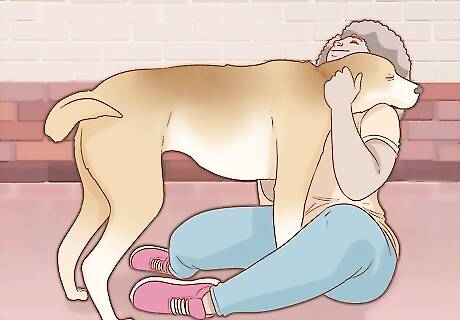
Spend plenty of quality time together. Set aside lots of time to cuddle on the sofa, gently brush your dog’s coat, practice doing tricks, and play games together. Your pal might not be a puppy anymore, but it still needs your companionship. Dogs have emotions, and aging is even more of an adjustment for them than it is for their owners. Focus on enjoying the present and make the most of your time together. Even if your senior dog has a little trouble getting around or doesn’t see as well as it used to, chances are it has plenty of pep left. With advances in veterinary care, dogs live longer, healthier lives than ever.
Identifying Common Issues
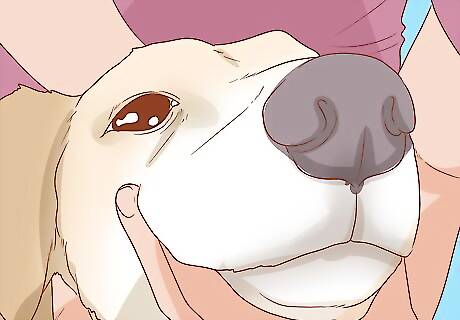
Perform health checks regularly. A few times a week, check your dog’s eyes, nose, and ears for discoloration, discharge, and any other signs of illness. Check its head, neck, stomach, and limbs for any unusual lumps or growths, and feel its belly and ribs to monitor its weight. Listen to its breathing, and notice any wheezing, coughing, or labored breathing. Bring your dog to the vet if you notice any unusual symptoms. If your dog has any known health issues, ask the vet how you should monitor its condition.
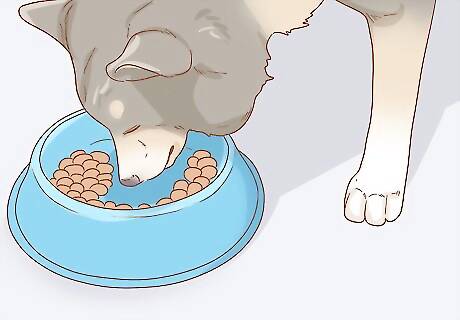
Monitor your dog’s eating, drinking, and bathroom habits. Take note if your dog seems to be excessively thirsty or stops eating or drinking. Keep track of how frequently it urinates and has bowel movements, and notice any changes in the color or consistency of its stools. Eating, drinking, and potty habits can offer key insight into a pet’s health. For instance, frequent urination and excessive thirst may be early indicators of diabetes, kidney disease, or liver issues.
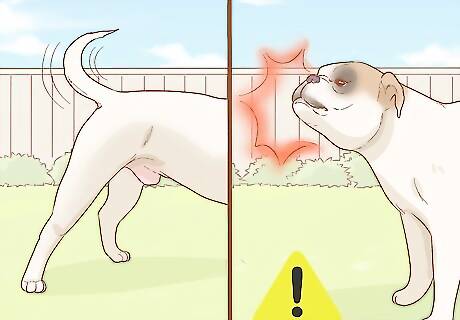
Notice signs of mental decline, such as confusion and aggression. As in humans, senior pets can develop senility, so look for any unusual changes in behavior. Signs can range from increased barking and aggression to incontinence, wandering, and disorientation. You know your dog better than anyone, so give the vet a call if you notice any causes for concern. If necessary, discuss strategies for managing your senior dog’s behavioral changes with the vet. Playing with your pet, sticking to a predictable routine, moderate physical exercise, and providing mentally stimulating toys can help keep it mentally active.
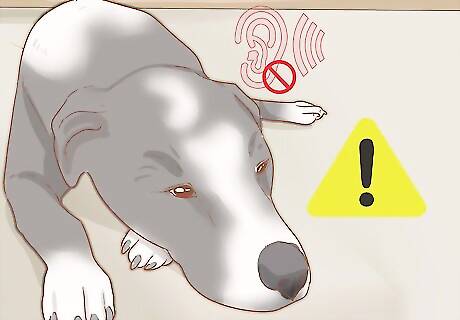
Look for signs of vision and hearing loss. The sooner you catch signs of these problems, the sooner you can start making adaptations around your home to help your dog cope. Take your dog to the vet for an evaluation if you notice that your dog: Bumps into things, has trouble finding treats or toys, or avoids eye contact. A dog with vision problems may also become anxious or clingy. Has trouble responding to its name or verbal commands. Your dog may also become unresponsive to noises that used to get its attention, like the sound of a favorite toy or your keys jingling.
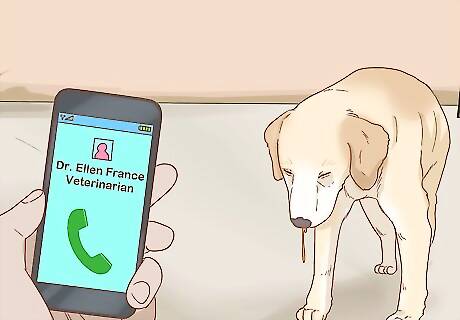
Call the vet if you notice any behavioral changes or signs of illness. Remember, it’s better to err on the side of caution and consult the vet if you think something’s wrong. The sooner you catch a health problem, the better the chances of successfully managing it.End of life care: Despite advances in veterinary care, sometimes treating health issues in older pets isn’t possible. If your senior dog is ill and its quality of life is poor, saying goodbye is the right decision, as heartbreaking as it is. If the situation arises, have an honest conversation with the vet about what’s best for your pet.




















Comments
0 comment